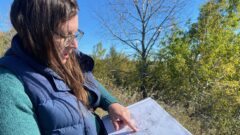Protection of wetlands could come down to farmers, says a new report
A new report by the Union of Concerned Scientists argues that farmers can play a key role in protecting and restoring wetlands in the Upper Midwest. A key solution lies in the farm bill, specifically in strengthening policies that encourage farmers to take part in conservation, restoration, and sustainability efforts. Read the full story by Interlochen Public Radio.
Great Lakes Commission
https://www.glc.org/dailynews/20241206-farmer-wetland-protection




